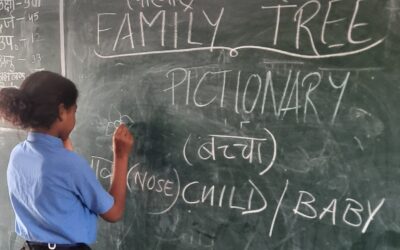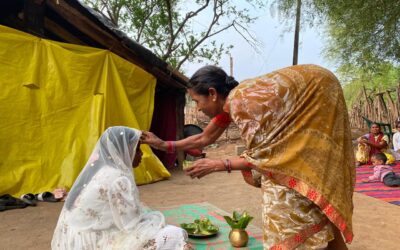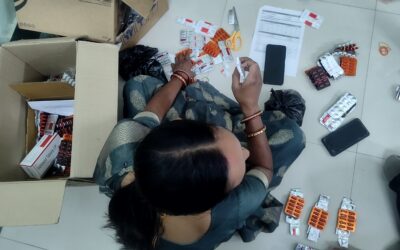Travel (home to block hospital) – Rs 200
Medicine – Rs 300
Travel (block hospital to private clinic) – Rs 100
Medical expenses (doctor fees, caesarean delivery charges, medicines) – Rs 22,000
Travel (private clinic to home) – Rs 200
Total Expenditure (in 3 days) – Rs 22,800
The above is the total expenditure (approximate) incurred by Santosh Rai for his wife’s delivery. His wife had severe complications during pregnancy due to which she was referred to a private clinic for a caesarean delivery. The block hospital near their village is equipped only for normal deliveries. Santosh is a wage laborer in rural Bihar and earns Rs. 20,000 to Rs 25,000 annually. This one time expenditure cost him much more than he could ever imagine.
He took loans from various people in his village but is unsure how he would repay the loan. Santosh is not sure whether he should be happy that he could save his wife and newborn or worry about their future.
In India, more than two-thirds expenditure on health is made out of pocket. This might be even higher for the rural population who end up spending more than they earn on health expenses. The lack of knowledge of health insurance schemes in rural people leads to such drastic out of pocket expenses. Due to the high expenditure costs, people either avoid health services even when needed or end up selling their assets or taking unreasonable loans to cover the costs.
The Rashtriya Swasthya Bima Yojana (RSBY) is a health insurance scheme, introduced by the government of India for the below poverty line families to reduce out of pocket expenditure on health and increase access to health services. It provides for cashless insurance for hospitalization in public as well as private hospitals. RSBY was launched in early 2008 and was initially designed to target only BPL families, but later it was expanded to cover others like – street vendors, licensed railway porters, domestic workers, sanitation workers, beedi makers, mine workers, rickshaw pullers, auto/taxi drivers, construction workers, MNREGA workers and rag pickers.
The beneficiaries under RSBY are entitled to hospitalization coverage up to Rs. 30,000/- per annum, for most of the diseases that require hospitalization. The benefit will be available under the defined diseases in the package list. The coverage extends to maximum five members of the family which includes the head of household, spouse and up to three dependents. Additionally, transport expenses of Rs. 100/- per hospitalization will also be paid to the beneficiary subject to a maximum of Rs. 1000/- per year per family. The beneficiaries need to pay only Rs. 30/- as registration fee for a year.
(More details on this scheme available here – www.rsby.gov.in)
In the villages, the Accredited Social Health Workers (ASHA) or Anganwadi workers inform the villagers few days before the registration camps are set up. The process of registration for the RSBY scheme, popularly known as the Smart Card is simple. Santosh Rai also had a Smart Card which he had taken along with him during his wife’s delivery, hoping that the hospital charges would be covered under it. When he approached the hospital reception and showed his card, he thought that he would get the amount he was claiming immediately.
Instead he was given a form which he had to fill and submit along with medical bills and personal documents. Luckily, his nephew, who was educated enough to understand such complex documents was there to help him. In a day he got the paperwork ready and returned to the clinic along with his nephew. The clinic informed him that the form filling was just the initial step. Now, he had to get another form signed from the mukhya or ward member and then go to the district and get the District Magistrate’s signature. After getting this done, the process of filing the claim will be initiated.
It is no surprise that Santosh, a poor man with no local influence got caught up in this unnecessary bureaucracy. It has been a year and he has not been able to pay off his loans. Few men like Santosh, who initially believed that the RSBY scheme might actually help them, had their belief shattered. Most other people in the villages do not wish to get a Smart Card made and we cannot blame them for their distrust in the government system. If the state wants to provide universal, free, quality healthcare then they have to think of schemes which they can implement to provide services to the poor.
The scheme might look good on paper but if the challenges while implementing it in the ground level is not looked upon, then there is not point to it. The public health system in India is struggling to provide adequate health services to its population. The rising out of pocket health expenditure is a major barrier in the eradication of poverty or achieving any other development goals. It is time the government reviews its health schemes to see whether it is truly benefiting even a part of its target population.




Dyuti, you should look at Health Mutuals , that design and run their own health insurance. search for Uplift Mutuals.